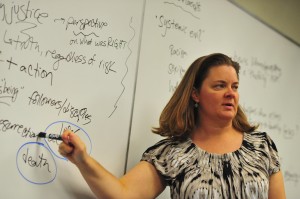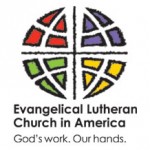Last Saturday, Donald Trump talked about his and Ben Carson’s religions at a rally in Florida:
“I’m Presbyterian,” he said. “Boy, that’s down the middle of the road, folks, in all fairness. I mean, Seventh-day Adventist, I don’t know about. I just don’t know about.”
Think Progress has already done a great job debunking the first part of his statement, pointing out that the Presbyterian Church (USA) is more appropriately characterized as a
“liberal mainline denomination, a category that includes several other historic Protestant groups such as the Evangelical Lutheran Church in America, the Episcopal Church, and the United Methodist Church. [They] all skew towards the progressive end of the religio-political spectrum.”
Key indicators of this include the church’s stance on immigration and same-sex marriage which are not in line with the Republican Party.
It’s the second part of his statement that is something I’m likely to hear in my classroom, specifically my introductory course on Christianity. I am no expert on the Seventh-day Adventist Church, and to be sure, there is no universe in which I will vote for or defend Ben Carson’s stance on any issue.
But there is a world in which a student in my class would say what Trump did: “Seventh-day Adventist, I don’t know about. I just don’t know about.” And I am experienced in introducing the complicated Christian tradition to young people who “just don’t know.” 
Let’s imagine this student’s name is DJ.
So you “don’t know” about Seventh-day Adventist, DJ? I don’t blame you, actually. It is a smaller Christian denomination that was founded in the late nineteenth century in the U.S. There are about fourteen million people who are counted as members, according to some sources.
Let’s focus on the name of the denomination, which gives us a good window into the tradition.
See how it has two parts? Seventh-day. Adventist. If you remember the importance of these two things, you’ll be ready for the midterm exam.
First: “Adventist” is from the word “advent,” which is from the Latin adventus, and it means “arrival.” Yes, like the season of “advent” that many Christian churches celebrate leading up to Christmas … the “arrival” of Jesus. Here, it refers to the second coming, and their belief that Jesus is about to come back at any moment. Just like we talked about the way Paul and the early church believed Jesus was coming back next Tuesday!
This is how they got started, actually, when a preacher named William Miller proclaimed that Jesus was going to arrive in 1844. He didn’t. Miller faded away and Ellen White became the prophet of the church. Her writings are still followed to this day. In fact, the BBC article you can read for next time points out that:
“White taught that Jesus had indeed come again, but not to Earth. Jesus had actually returned to the ‘most holy place’ of the heavenly temple. Jesus, she said, had started to ‘cleanse’ the heavenly temple, and when he had done that, he would come to start cleansing the Earth.”
And be ready, because it might be next Tuesday!
Ellen White is also the one who taught that the Sabbath should be held on Saturday. Why?
This brings us to the second part of the name: “Seventh-day” indicates their adherence to the Jewish practice of Sabbath on Saturday, which is what the earliest followers of Jesus would have observed. This is one indication that the Seventh-day Adventist would most likely be categorized as one of the restorationist Christian denominations that we’ve read about, remember? Right. The ones who have among their beliefs that the authentic version of Christianity died out shortly after the earliest church, and that they are called to restore it.
Yes, DJ, like the Mormons. And remember how we talked about the way that Mitt Romney’s Mormon faith was somewhat of an issue for conservative evangelicals in the 2012 election? I imagine the same dynamic will emerge if Ben Carson continues to be a contender for the presidency. Is he a Christian? Some say no, including voters in Iowa. As we’ve talked about, it depends on what your definition of Christian is, and who gets to decide.
Weird? You think that some of their beliefs are weird? Like the Saturday Sabbath, the heavenly temple cleansing, the investigative judgement, and the millennial insistence on a literal, visible, and personal return of Jesus? I imagine that a Seventh-day Adventist would think that some of your beliefs are weird, too. In fact, they’d argue that your denomination isn’t truly Christian since it has inherited all the baggage of the past two thousand years of doctrinal debate.
And let’s be clear, most religious beliefs are weird: Dead bodies come back to life? Drinking blood? Eating flesh? Talking to an invisible friend? Weird.
Yes, DJ, it’s all in the eye of the beholder. Or the believer.
So the next time you “just don’t know” about another person’s religion … take a minute and find out.
You might be surprised at the interesting things you can learn.
Image mine.












